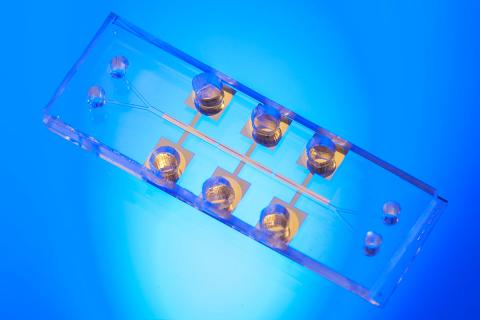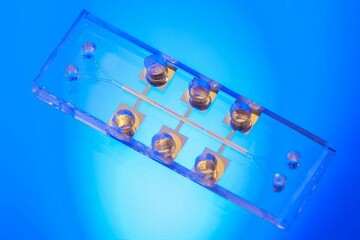Fighting Cancer & Other Diseases with Engineering
CAMBRIDGE, MA – Cancer is the second leading cause of death in the United States. Clinicians often have difficulty predicting how well a patient may respond to treatment, including surgery and drugs, and may need to try several options before achieving success. Radiation, chemotherapy and other treatments usually have disruptive side effects that are particularly frustrating for patients when not successful.
Microfluidic devices can provide clinicians the ability to study their patients’ organs and tissues in a realistic environment to observe how the cells will behave and respond to treatment options. Leaders in the field, including biomedical engineers from Draper, will discuss their work in this area at the Massachusetts Institute of Technology’s Koch Institute for Integrative Cancer Research on March 15 at 11:30 a.m.
“Using Draper’s deep expertise in microfluidics, we have developed tools like Draper’s multi-organ system model—a revolutionary human organ system on a chip platform,” explained Tara S. Clark, Draper’s vice president for commercial business. “The unique platform allows researchers to test drugs in organ systems containing both diseased and healthy human tissues in vitro. This breakthrough capability enables rapid and in-depth observation of human responses to therapies, an invaluable tool for drug developers.”
The event will feature presentations from Draper experts on topics including:
- Sembler—a Draper initiative that makes the company’s resources, facilities and more than 80 years of multidisciplinary engineering expertise available to entrepreneurs.
- Draper’s organ system models, which include replicating a human kidney to test toxicity of therapeutics for cancer and other diseases.
- Microfluidic systems to build blood vessel networks that apply to the study of infectious diseases, atherosclerosis and other conditions.
The event also will feature Jonathan Gilbert, director of scientific partnerships at SQZ Biotech, which is developing methods to engineer cell function and harness the power of a patient’s own cells to combat disease more effectively; Madeleine Oudin, a postdoctoral fellow at MIT’s Gertler Lab, who is using microfluidics to study metastasis; and Suman Bose, a postdoctoral fellow in MIT’s Anderson/Langer Lab group, who is studying the use of microfabricated immune-isolating devices for cell-based therapies.
Click here for free registration.
Released March 3, 2016

